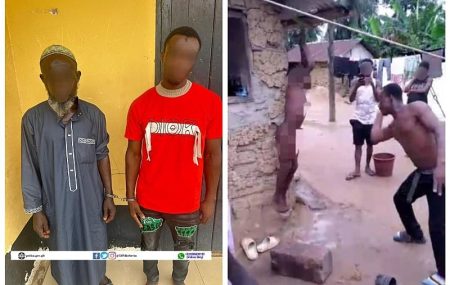This case revolves around a violent altercation between two individuals, Kojo Senagbe, a 52-year-old steel bender, and Oliver Zinto, a carpenter, both residing in Community 14 Annex, Lashibi. The incident, which transpired on the night of April 10, 2025, stemmed from Senagbe’s suspicion that Zinto was involved romantically with his girlfriend. This perceived betrayal fueled a violent outburst, resulting in Senagbe attacking Zinto with a machete, inflicting wounds on his scalp, ear, arm, and back. The attack highlights the devastating consequences of unchecked jealousy and the potential for violence when personal relationships are perceived to be threatened.
The narrative unfolds with Zinto walking home late at night when he was confronted by Senagbe on a pathway. Upon ignoring Senagbe’s command to stop, Zinto was subjected to a brutal attack, the sharp blade of the machete tearing into his flesh. Despite the sudden and violent assault, Zinto managed to defend himself, overpowering his attacker and wresting the weapon away. This act of self-preservation prevented further injury and secured crucial evidence for the ensuing legal proceedings. The incident underscores the importance of self-defense skills in precarious situations while simultaneously highlighting the unpredictable nature of violent encounters.
The aftermath of the attack saw bystanders rushing to Zinto’s aid, providing immediate first aid before reporting the incident to the Klagon Police. The police, upon receiving the report and assessing the severity of Zinto’s injuries, issued a medical form, enabling him to seek further medical attention. This prompt response by both the bystanders and the police played a crucial role in ensuring Zinto received the necessary medical care and initiating the legal process against Senagbe. The swift action taken by law enforcement demonstrates their commitment to maintaining order and holding perpetrators accountable for their actions.
Senagbe’s arrest two days later, on April 12, marked a turning point in the case. During his cautionary statement, he confessed to the attack, revealing his motive as stemming from his belief that Zinto had “taken over” his girlfriend. This confession, admitting both the act and the rationale behind it, provided critical evidence for the prosecution. The retrieval of the machete by the police further solidified the case against Senagbe, providing physical evidence that directly linked him to the crime.
The legal proceedings culminated in Senagbe changing his initial plea of not guilty to guilty, effectively admitting his culpability in the attack. Presiding over the case, Mr. Kwabena Kodua Obiri Yeboah, found Senagbe guilty of causing harm and imposed a sentence reflecting the severity of the crime. He was fined GHS7,200, with an additional six-month prison term if he defaulted on the payment. Furthermore, he was ordered to compensate Zinto GHS5,000 for the injuries sustained. This sentence sought to address both the punitive and restorative aspects of justice, punishing Senagbe for his actions while also providing some measure of financial redress to the victim.
The case of Kojo Senagbe and Oliver Zinto serves as a stark reminder of the potential for violence when emotions like jealousy and possessiveness are left unchecked. It underscores the devastating consequences of resorting to violence to resolve personal conflicts and the importance of seeking peaceful and legal avenues for redress. The swift action of bystanders and law enforcement in this case highlights the crucial role community members and authorities play in maintaining peace and ensuring justice is served. Moreover, the court’s decision reflects the legal system’s commitment to holding perpetrators accountable and providing restitution to victims of violent crimes.














